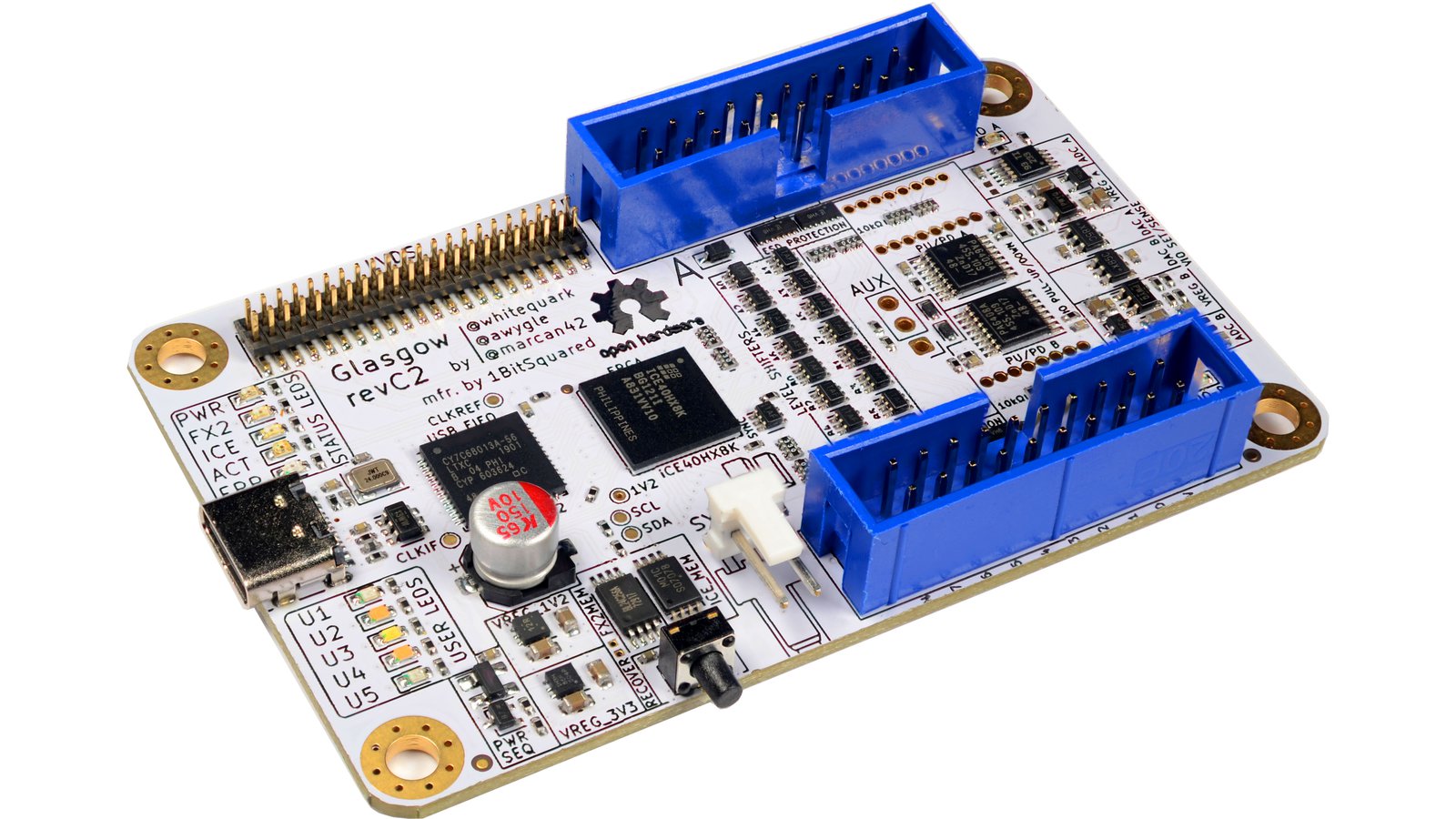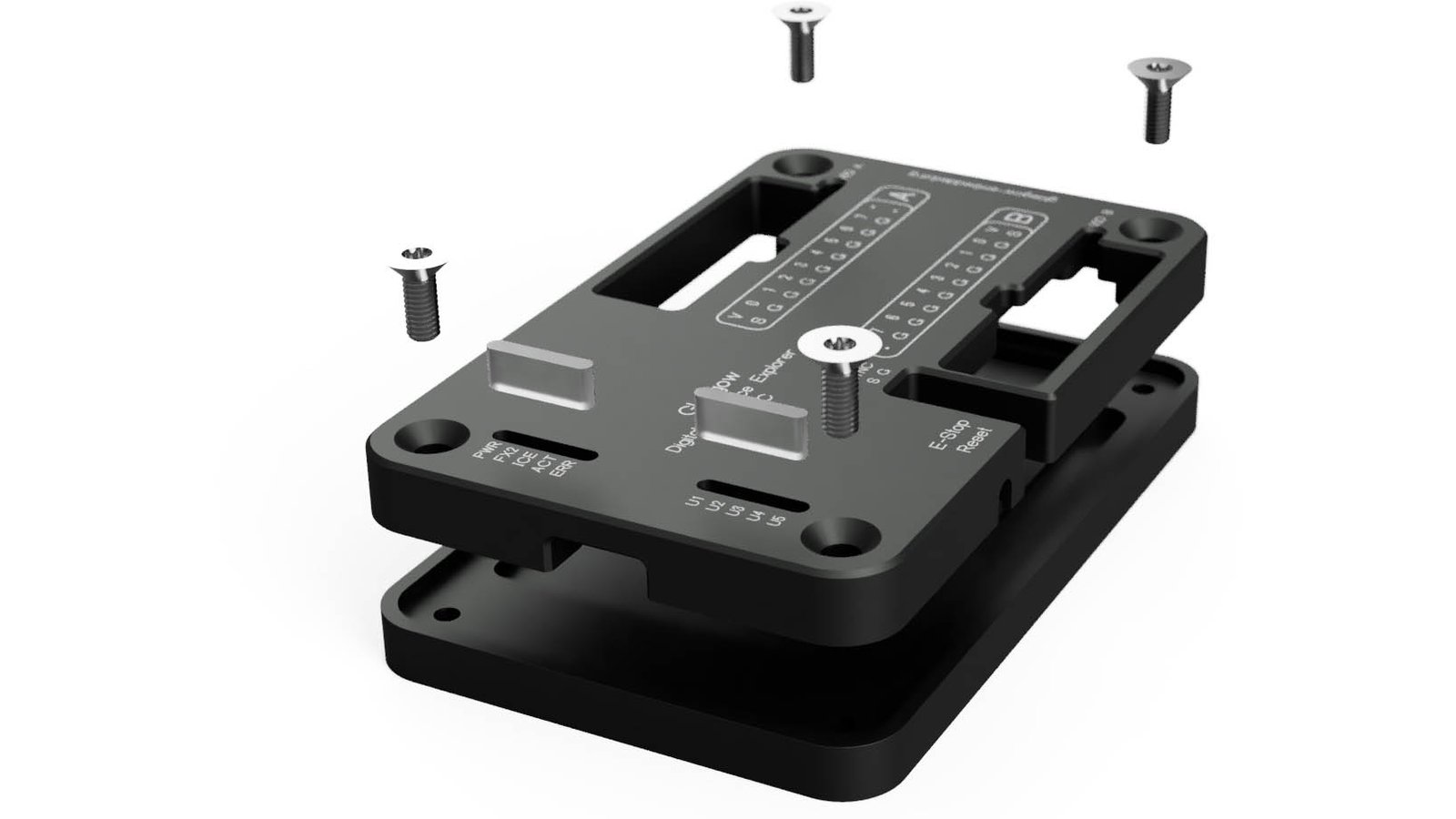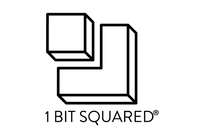1BitSquared
Protocol Interfaces
KiCad
Glasgow Interface Explorer
A highly capable and extremely flexible open source multitool for digital electronics
Funding ended on Feb 02, 2021 at 03:59 PM PST.
1BitSquared
Protocol Interfaces
KiCad
Funding ended on Feb 02, 2021 at 03:59 PM PST.
Glasgow is intended for hardware designers, reverse engineers, digital archivists, electronics hobbyists, and anyone else who wants to communicate with a wide selection of digital devices with minimum hassle. It can be attached to most devices without additional active or passive components, and it provides extensive protection from unexpected conditions and operator error.
The Glasgow hardware can support many digital interfaces because it uses reconfigurable logic. Instead of offering just a small selection of standard hardware supported interfaces, it uses an FPGA to adapt — on the fly — to the task at hand without compromising performance or reliability, even for unusual, custom or obsolete interfaces.
The Glasgow software is a set of building blocks designed to eliminate system complexity. Each protocol is packaged into a self-contained applet that can be used directly from the command line or integrated into a more complex system. Using Glasgow does not require any programming knowledge, though it is much more powerful if you know a bit of Python.
To illustrate some strengths of Glasgow, here are a few usage examples.
Glasgow can be used as a USB-to-serial adapter, but better.
Unlike traditional serial adapters it can auto-detect the target voltage and "mirror" it. It will auto-detect the baud rate of the target and follow it on the fly. It can directly interface to inverted signal UART interfaces, which would ordinarily require additional debugging components, like buffer transistors.
Glasgow has built-in support for InfluxDB. So any applet that reads out sensors can directly log the data and you can visualize them in Grafana with very minimal effort. We already have support for some CO2 and particle sensors.
Today there are a lot of different LED display technologies available. Like "intelligent" RGB LEDs with built in PWM controllers, for example WS2812 or APA102. There are LED matrix display panels with myriad of shift register based interfaces like HUB75, HUB75e, HUB8, HUB12 and many more.
All of them use fairly nonstandard protocols. From timing-driven one-wire interfaces, through fairly normal SPI interfaces to multichannel parallel shift register interfaces. Typical protocol adapters only provide a specific subset of hardware supported interfaces. Everything beyond that has to be implemented with so called bit-banging. Bit-banging means that the processor or the PC has to control I/O step from software, in some cases even through USB. This is cumbersome if not impossible due to the timing constraint and USB speed.
In the case of Glasgow, that can be easily reconfigured. It is possible to experiment and prototype with these devices quickly and with minimal hassle. Just a few lines of nMigen and Python and you are ready to go.
If you are interested how it is done, watch Attie implement HUB75 interface support.
Safety is an important design requirement for Glasgow, we addressed it in multiple ways.
We designed a beautiful CNC-milled aluminum case to keep your Glasgow safe from damage — from short circuits on the bench or the exercise shorts in your travel bag. It’s available as an option.
Glasgow revC aluminum case. (Design and 3D rendering by @timonsku)
Working with untested or unknown devices can be risky. Short circuits, electrostatic discharge, high voltages can quickly destroy our project or test equipment. Glasgow is ready for this. All I/O are ESD, over- and under-voltage protected. We have made sure that the hardware will survive a I/O and supply short and not reset, but rather detect a set current threshold fault and act accordingly thanks to I/O supply current monitoring.
For the urgent situations where one might want to quickly put Glasgow back in safe mode; we have added an easy to reach E-Stop/Reset button. It is located on the side of the board, so a quick squeeze of the Glasgow will bring it back into an electrically safe state. This button is hardwired to the Glasgow circuitry and results in a safe reset even if the software or gateware is faulty.
Glasgow revC aluminum case, E-Stop/Reset button and sync connector detail. (Design and 3D rendering by @timonsku)
Glasgow is already capable of performing these tasks:
Note: features marked with "WIP" are Work In Progress, which means they are preview only and require more work or even a rewrite.
Most of the above can be done with only a Glasgow revC board, some wires, and — depending on the device under test – external power. In most cases no additional front end circuitry is needed.
| Glasgow | HardSploit | Tigard | JTAGulator | HydraBus | GoodFET | GreatFET | BusBlaster | BusPirate | |
|---|---|---|---|---|---|---|---|---|---|
| UART | Y | Y | Y | Y | Y | N | Y | N | Y |
| SPI | Y | Y | Y | N | Y | Y | Y | N | Y |
| Parallel | Y | Y | N | N | N | N | Y | N | N |
| I2C | Y | Y | Y | N | Y | Y | Y | N | Y |
| JTAG/SWD | Y | Y | Y | Y | Y | Y | Y | Y | Y |
| Logic Analyzer | Y | Y | Through Bitmagic | Y | Y | Y | Y | N | Y |
| Extensibility | FPGA | FPGA | FTDI | MCU | MCU | MCU | MCU | CPLD | MCU |
| Interface | CLI,API | CLI,GUI,API | CLI,GUI,API | CLI | CLI | CLI | CLI | CLI | CLI |
| I/O count ¹ | 16 | 64 | 14 | 24 | 44 | 9 | 100 | 9 | 7 |
| Cascading ³ | Y | N | N | N | N | N | N | N | N |
| Indep. I/O ⁴ | 2 banks | 8 banks | 1 bank | 1 bank | 1 bank | 1 bank | 1 bank | 1 bank | 1 bank |
| I/O Voltages | 1.8-5 V | 3.3 V, 5 V | 1.8 V, 3.3 V, 5.5 V | 1.4-3.3 V | 3.3 V | 3.3 V | 3.3 V | 1.5-3.3 V | 3.3 V, 5 V |
| I/O Speed ¹ ² | 100 MHz | 25 MHz | 25 MHz | 15 kHz | 42 MHz | 1 Mbps | 50 MHz | 6 MHz | 1 Mbps |
| USB | Type C | Type Mini-B | Type C | Type Mini-B | Type Micro-B | Type Mini-B | Type Micro-B | Type Mini-B | Type Mini-B |
| Open Hardware | Y | N | Y | Y | Y | Y | Y | Y | Y |
| Cost | $130 | $320 ⁵ | $39 | $170 | $80 | $50 | $100 | $45 | $37 |
Glasgow Interface Explorer is written in Python 3. The interface logic that runs on the FPGA is described using nMigen, which is a Python-based domain-specific language (DSL). The supporting code that runs on the host PC is written in Python with asyncio. This way, the logic on the FPGA can be assembled on demand for any requested configuration, keeping it as fast and compact as possible, and code can be shared between gateware and software, removing the need to add error-prone "glue" boilerplate.
Glasgow would not be possible without the IceStorm, open source iCE40 FPGA toolchain, which is reliable and extremely fast. For instance, it only takes a few seconds to rebuild the FPGA bitstream for the UART protocol. When developing a new applet, it is rarely necessary to wait for the toolchain.
Implementing reliable, high-performance USB communication is not trivial – packetization, buffering, and USB quirks add up. Glasgow abstracts away USB. On the FPGA, applet gateware writes to or reads from a FIFO. On the host, applet software writes to or reads from a socket-like interface. On a modern PC, idiomatic Python code can communicate at maximum USB 2 "high-speed" bandwidth. Moreover, this design is relatively future proof, as it can support different transports, such as Ethernet, without requiring changes to applet code.
Debugging new applets can be hard, especially where bi-directional buses are involved. Glasgow provides a built-in, cycle-accurate logic analyzer that can relate the I/O pin level and direction changes to commands and responses received and sent by the applet. The logic analyzer compresses waveforms and can pause the applet if its buffer is about to overflow.
Glasgow has been developed and refined over the last few years by a dedicated group of engineers. Many people have built their own hardware and are already using it in production. A lot of these early adopters are contributing additional applets and documentation. We welcome you to drop in to the Glasgow Discord channel or Glasgow Freenode IRC channel to talk about your ideas and ask questions!
For more technical discussion of Glasgow, please visit our GitHub Glasgow Organization.
We have a section of the 1BitSquared Forum dedicated to Glasgow.
Give esden and whitequark a follow on Twitter. Both of them regularly post Glasgow updates.
You get the following:
The aluminum case option adds:
Glasgow revC aluminum case parts (Design and 3D rendering by @timonsku)
The case comes as a kit, and is easy to assemble. The case covers up some of the optional connectors on the Glasgow PCB. If you need access to these connectors, the bottom half of the case can be used alone, and will still provide protection to the underside of your Glasgow.
We have ordered the final prototype version of Glasgow revC2 and we are finalizing the latest hardware revision. We have the full Bill Of Materials (BOM) and several quotes from part suppliers. We are talking with our PCB production and assembly house, to prepare for production. The pogo-pin test jig electronics are designed and assembled. The production tester is ordered. The first batch of flywire cable harnesses has been produced and delivered to us.
Before the campaign is over, we will place the order for the parts and PCBs for the first production batch. We will be ordering the sync and USB-C cables while the campaign is in progress. Depending on the demand we will place another order for parts and boards as soon as the campaign is over. We will order the cases for Glasgows as soon as the campaign ends. We will keep you up to date about the progress in our campaign emails.
Glasgow will be assembled at our contract manufacturer in China. Quality assurance (QA) testing and kitting will be done at 1BitSquared in Eugene, Oregon, USA. As soon as the kits are packed and labeled, we will send them to Crowd Supply to fulfill your pledges via their logistics partner, Mouser Electronics. For more information, you can refer to this useful guide to ordering, paying, and shipping. You can confirm and update your order details and more in your Crowd Supply account.
Creating physical objects is always risky. Parts might not ship on time, or they might arrive later than we planned, or might get stuck in customs. Parts might be discontinued or change without prior announcement from the manufacturer. Fortunately, 1BitSquared and our contract manufacturer have been manufacturing electronics hardware for many years, and have ample experience resolving any issues.
Glasgow revC CNC milled painted acrylic prototype (Design and prototype by @timonsku)
Timon designed the aluminum case and is coordinating its production. He has many years of experience designing and producing cases for electronic products. The CNC milling manufacturer we work with has worked with us in the past and we know they can deliver a high quality product.
As with our other campaigns, we will be honest about any issues or delays that we run into and provide updates explaining how we are addressing them. We know that many of you are interested in the manufacturing process, and we will be sure to share our journey. We will do our best to get the Glasgow to you as fast as we can. :)
Produced by 1BitSquared in Eugene Oregon, USA.
Sold and shipped by Crowd Supply.

You get one Glasgow revC and a full set of flywire, sync, and USB-C cables.
Want to buy this item? Check the current project page for the latest information.

A beautiful CNC-milled and anodized aluminum case to keep your Glasgow safe -- from short circuits on the bench or the exercise shorts in your travel bag. Glasgow not included.
Want to buy this item? Check the current project page for the latest information.

· 1BitSquared · 1BitSquared · 1bitsquared.com
Embedded hardware and tool development and manufacturing company. We create hardware focused on promoting and supporting open source projects.